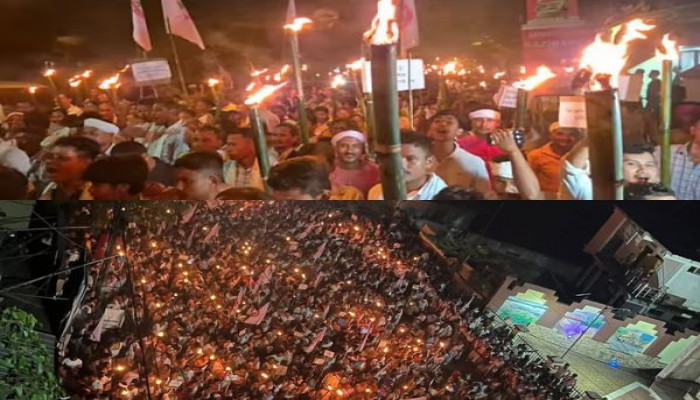Assam: Tai-Ahom hold torchlight rally demanding long-pending ST status
- In Reports
- 07:54 PM, Oct 30, 2025
- Myind Staff
Thousands of Tai Ahom people marched with torches through the streets of Moran town in eastern Assam on Tuesday evening, October 28, 2025, demanding Scheduled Tribe status for their community.
Moran, located in Dibrugarh district about 400 kilometres east of Guwahati, turned into a sea of lights as the rally took over the town.
The event was organised by community groups such as the Tai-Ahom Yuba Parishad Assam and the All Tai Ahom Students’ Union. It followed a series of similar protests by other communities that have also been asking for Scheduled Tribe recognition.
The Tai Ahoms are one of six communities that have been fighting for this status for over two decades. The others include the Adivasi, known as tea tribes and made up of nearly ninety-five ethnic groups, along with the Chutia, Koch Rajbanshi, Matak, and Moran communities. At present, they are listed under the Other Backward Class category.
These groups have been pressing the Bharatiya Janata Party government to deliver on its promise made before the 2014 Lok Sabha elections to grant them Scheduled Tribe status.
TAYPA president Diganta Tamuly said the Tai Ahoms would boycott the BJP before the 2026 Assembly elections if the government failed to act. “We have been waiting for more than a decade. The BJP will face severe backlash if their betrayal on the ST status issue continues,” he said.
The BJP had first made the promise during Prime Minister Narendra Modi’s 2014 campaign in Assam.
The Ahoms, who once ruled much of Assam for six centuries, hold strong political influence in the eastern districts of Charaideo, Dhemaji, Dibrugarh, Golaghat, Jorhat, Lakhimpur, Sivasagar, and Tinsukia. The Adivasis, making up just under twenty per cent of Assam’s voters, are also a key electoral force in these regions.
The demand for Scheduled Tribe status has been a recurring election issue since the 1990s when the Koch Rajbanshis were briefly added to the tribal list but later removed after protests from existing tribal groups like the Bodos, Karbis, Mishings, and Rabhas.
Chief Minister Himanta Biswa Sarma has said the government is looking for a “middle path” to balance the demands of the six communities and the concerns of existing tribal groups. He urged the communities to wait for the Group of Ministers report on the issue.
The report is expected to be presented in the State Assembly on November 25.
Meanwhile, the Coordinating Committee of Tribal Organisations of Assam, representing the state’s tribal groups, has strongly opposed granting Scheduled Tribe status to what it called six “advanced ethnic groups”. The committee warned that the move would “destroy” Assam’s existing tribes by taking away their rights and benefits.
The CCTOA also pointed to history, noting that the Ahoms ruled Assam for six centuries, the Chutias had their own kingdom before them, and the Koch Rajbanshis once ruled large parts of Assam, West Bengal, and present-day Bangladesh.
The All Assam Tribal Sangha added that the Adivasis, who were brought to Assam by British tea planters from central and eastern India, are not indigenous to the state. It said that “interstate complications” remain a major hurdle in their inclusion in the tribal category.







Comments